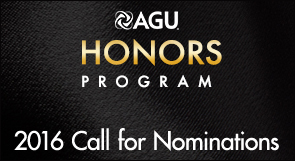I’ve written in the past about the importance of nominating underrepresented groups for AGU awards, and it’s heartening to see that the Union is making progress on that front. For example, for Union awards, the numbers of female nominators, nominees and honorees all increased from 2014. 31% of nominees were women (vs. 21% in 2014), 19% of nominators were women (vs. 16%), and 36% of honorees (vs. 15% – wow!). That’s far more in line with the 26% of AGU that identifies as female.
Now that AGU is accepting nominations for this year’s awards (the deadline is March 15), I thought I’d throw out a pitch for a different demographic, the early career awards – and particularly the one that I’m most heavily involved in, the Science For Solutions Award.
To start with, AGU has lots of early career awards:
But Science For Solutions is near and dear to my heart, since I’ve been a part of its committee since its inception. It’s a fairly new award, and not specific to any field of research – it’s open to anyone who applies their science to help solve societal problems. This is the fourth year it’s being offered, and there have been only two previous winners.
Hold on, you say. Two? Shouldn’t there have been three? Well, yes. But last year, the award actually didn’t receive any new nominations.
Think about that for a moment. No one in the entire 60,000-person society decided to put forward an outstanding postdoc or grad student for an award that recognizes applied geoscience. Now, I as chair of the committee am not blameless here – I recognize that I need to be more effective in recruiting for the award. I tried to do this to some extent through my personal contacts, but many of mine are still early-career people themselves, and putting together a nominations package can seem like a daunting task if you’ve never done one before. (I couldn’t nominate someone myself without causing a conflict of interest, unfortunately.) This year, I’m starting off with a blog post, and I’m going to try to be more active promoting on social media and elsewhere.
Another problem might be the (incorrect) assumption that nominations submitted by early-career members might not carry the same weight or be as successful as those submitted by senior scientists. This just isn’t true, especially when you’re talking about an award that in its best year didn’t receive more than ten nominations. I’m certainly not going to look at a well-written nomination letter and say, “Well, this would be great but the person who wrote it isn’t famous/late-career/whatever, so it’s obviously not as good as the others.” If you think your nominee has a shot, GO FOR IT. Please. And if you think you could qualify for an award, ask someone else to nominate you! It’s totally okay! (There are a bunch of other myths about the Honors process that you can read about here.)
Say you’ve decided to give it a shot (hooray) and you’re now digging through the Honors website for the award criteria. But maybe they’re a little vague, or you’re confused as to whether your nominee fits. Good news – that’s a totally solvable problem! If you have questions about what the judging committee is looking for, ask. Beth Paredes ([email protected]) and her cohort (look under “Contacts” are your go-to resources for help with awards, and they are happy to help if it means the committees will have a good pool of applicants to choose from.
If you’re thinking, “This is great in theory, but who has time for this kind of thing?”, I completely understand. March 15th isn’t that far away and it can be a pain to get all the letters and CVs and other materials assembled, particularly if you have to ask other people for them. That’s why you should start doing it right now. It will be a lot less painful and less rushed in the end.
I feel really bad that the Science For Solutions Award wasn’t given out in my first year as chair of the committee. I’m going to do my best to change that this year – but I need your help to do it. Look around your lab, department or office and see if anyone’s doing a fantastic job with applied science – and even if no one you know fits that category, consider nominating someone for one of the other awards. It’s a great way to make sure your peers and colleagues get credit for their accomplishments, and hey, it’s got to be a warm fuzzy feeling when your nominee wins, right?





















Discussion about this post